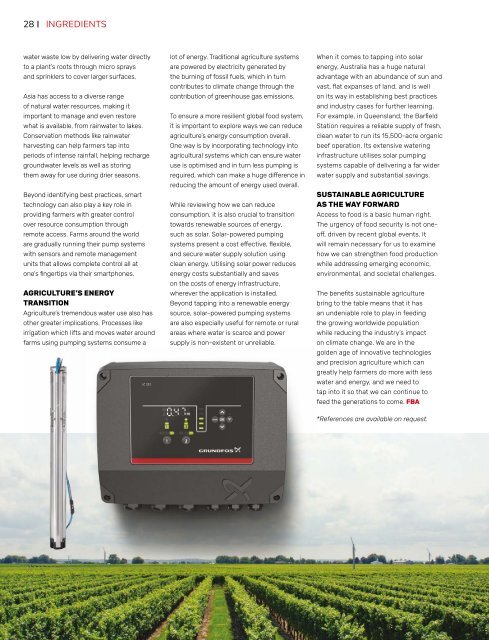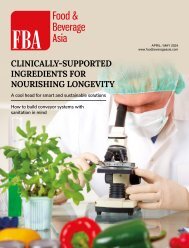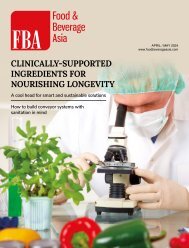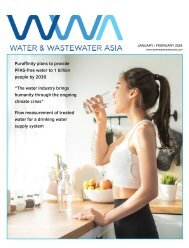Food & Beverage Asia October/November 2022
Food & Beverage Asia (FBA) is the leading source of food and beverage news in Asia since 2002. FBA delivers a comprehensive view of the food and beverage landscape, spanning across the latest health and nutrition trends and industry innovations in ingredients, recipe formulations, food science, sustainability, packaging, and automation, as well as advancements in agri and food-tech.
Food & Beverage Asia (FBA) is the leading source of food and beverage news in Asia since 2002. FBA delivers a comprehensive view of the food and beverage landscape, spanning across the latest health and nutrition trends and industry innovations in ingredients, recipe formulations, food science, sustainability, packaging, and automation, as well as advancements in agri and food-tech.
You also want an ePaper? Increase the reach of your titles
YUMPU automatically turns print PDFs into web optimized ePapers that Google loves.
28<br />
INGREDIENTS<br />
water waste low by delivering water directly<br />
to a plant’s roots through micro sprays<br />
and sprinklers to cover larger surfaces.<br />
<strong>Asia</strong> has access to a diverse range<br />
of natural water resources, making it<br />
important to manage and even restore<br />
what is available, from rainwater to lakes.<br />
Conservation methods like rainwater<br />
harvesting can help farmers tap into<br />
periods of intense rainfall, helping recharge<br />
groundwater levels as well as storing<br />
them away for use during drier seasons.<br />
Beyond identifying best practices, smart<br />
technology can also play a key role in<br />
providing farmers with greater control<br />
over resource consumption through<br />
remote access. Farms around the world<br />
are gradually running their pump systems<br />
with sensors and remote management<br />
units that allows complete control all at<br />
one's fingertips via their smartphones.<br />
AGRICULTURE’S ENERGY<br />
TRANSITION<br />
Agriculture’s tremendous water use also has<br />
other greater implications. Processes like<br />
irrigation which lifts and moves water around<br />
farms using pumping systems consume a<br />
lot of energy. Traditional agriculture systems<br />
are powered by electricity generated by<br />
the burning of fossil fuels, which in turn<br />
contributes to climate change through the<br />
contribution of greenhouse gas emissions.<br />
To ensure a more resilient global food system,<br />
it is important to explore ways we can reduce<br />
agriculture’s energy consumption overall.<br />
One way is by incorporating technology into<br />
agricultural systems which can ensure water<br />
use is optimised and in turn less pumping is<br />
required, which can make a huge difference in<br />
reducing the amount of energy used overall.<br />
While reviewing how we can reduce<br />
consumption, it is also crucial to transition<br />
towards renewable sources of energy,<br />
such as solar. Solar-powered pumping<br />
systems present a cost effective, flexible,<br />
and secure water supply solution using<br />
clean energy. Utilising solar power reduces<br />
energy costs substantially and saves<br />
on the costs of energy infrastructure,<br />
wherever the application is installed.<br />
Beyond tapping into a renewable energy<br />
source, solar-powered pumping systems<br />
are also especially useful for remote or rural<br />
areas where water is scarce and power<br />
supply is non-existent or unreliable.<br />
When it comes to tapping into solar<br />
energy, Australia has a huge natural<br />
advantage with an abundance of sun and<br />
vast, flat expanses of land, and is well<br />
on its way in establishing best practices<br />
and industry cases for further learning.<br />
For example, in Queensland, the Barfield<br />
Station requires a reliable supply of fresh,<br />
clean water to run its 15,500-acre organic<br />
beef operation. Its extensive watering<br />
infrastructure utilises solar pumping<br />
systems capable of delivering a far wider<br />
water supply and substantial savings.<br />
SUSTAINABLE AGRICULTURE<br />
AS THE WAY FORWARD<br />
Access to food is a basic human right.<br />
The urgency of food security is not oneoff,<br />
driven by recent global events. It<br />
will remain necessary for us to examine<br />
how we can strengthen food production<br />
while addressing emerging economic,<br />
environmental, and societal challenges.<br />
The benefits sustainable agriculture<br />
bring to the table means that it has<br />
an undeniable role to play in feeding<br />
the growing worldwide population<br />
while reducing the industry’s impact<br />
on climate change. We are in the<br />
golden age of innovative technologies<br />
and precision agriculture which can<br />
greatly help farmers do more with less<br />
water and energy, and we need to<br />
tap into it so that we can continue to<br />
feed the generations to come. FBA<br />
*References are available on request.


















